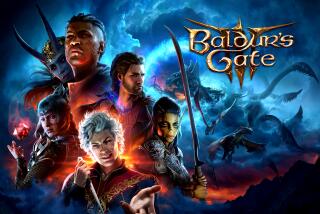Online Bullies Give Grief to Gamers
- Share via
When Kurt Frerichs comes home from a long day of fixing computers, he likes to eat dinner with his family, tuck his 2-year-old daughter into bed and settle in front of his PC with a steaming cup of black coffee to inflict nonstop misery on his fellow man.
The 25-year-old technology consultant relishes the indiscriminate slaughter of other players in online games, heaping scorn on his victims and exploiting programming bugs to his advantage.
Frerichs is what the online world calls a griefer--someone who plays to make others cry. They stalk, hurl insults, extort, form gangs, kill and loot. Although a tiny percentage of the millions who play online games, griefers are prolific in sowing distress and driving away thousands of paying customers.
As a result, the habits of griefers such as Frerichs have become an obsession for Sony Corp., Microsoft Corp. and Electronic Arts Inc. as the companies spend hundreds of millions of dollars building online games they hope will stir up mass-market interest.
To these companies, online games stand as a rare specimen--the profitable Internet business. Titles such as “EverQuest,” “Ultima Online” and “Dark Ages of Camelot” may have only a few hundred thousand subscribers each, but they consistently make money.
And the financial stakes are about to become much bigger. U.S. revenues from these games are expected to grow from $300 million to $1.8 billion by 2005.
There are about 1 million online game players in the U.S. and millions more overseas, particularly in South Korea, where there are several million players.
The game makers fear that virtual saboteurs will jeopardize the rise of online games by scaring away customers willing to spend $10 to $14 a month and are devoting significant resources to finding ways to stop the online mayhem.
Called persistent world or massively multiplayer games for their ability to accommodate thousands of simultaneous players, the games started decades ago as simple text-based games. As personal computers grew more powerful, these games acquired graphics that evolved into rich, immersing, fantastical worlds. Players can acquire virtual jobs, adopt pets, marry and own property.
At their genesis, these games were meant to be online Camelots where players adhered to a code of honor, but instead they quickly descended into anarchy. Stealing, killing, taunting and other forms of bad behavior against online characters mushroomed overnight. Experienced players would stalk novice players, called newbies, and kill them repeatedly.
For a griefer, it’s not the killing that is fun, because combat is inherent in many of these games. It’s the misery it causes other players.
“Griefers feed on the negative reactions of the people they kill,” said Frerichs, who savors his evil online persona and saves every nasty e-mail he gets from the people he has antagonized. “There’s nothing sweeter than when you kill someone and they spout insults at you for hours. That’s when you know you got him. It sounds really cruel, but it’s fun.”
Frerichs has received messages from parents of players, pleading him to play nice with their children, who are driven to tears by his antics.
Whereas Frerichs is motivated by a desire to role-play an evil persona, most griefers tend to be teenage boys who find it fun to see how far they can push social limits.
“I get off on causing other people grief,” said Robert L. Lee, a 16-year-old in Omaha who plays “Ultima Online.” “It gives me a feeling that I am on a higher level than they are. I find griefing way more fun than” killing online characters.
Often, the griefers’ characters adopt offensive screen names. The griefer’s arsenal of annoyance is large and varied.
Lately, “ninja stealing” has become especially rampant. A griefer waits around while another player slays a monster. Once the monster drops dead, it often gives up weapons, coins or other desirable items. Before the player can pick up the spoils, the griefer snatches the items and runs away.
Another common tactic is to lure a batch of monsters toward unsuspecting players. Monsters, which are run by computer programs, are generally instructed to kill the nearest players they see. By brushing past other players, the griefer can essentially trick the monsters into attacking someone else.
Griefers also can form a virtual mafia, blocking access to desirable areas of the game and demanding bribes. They also run cartels by hoarding game components, such as eye of newt or red hair dye, and charging inflated prices.
Often, though, simple mischief is at the root of grief play.
“We once had this roving band of thugs who were all craftsmen,” said Richard Garriott, who created “Ultima Online” two decades ago and is now creative director for game developer NCSoft Corp. in Austin, Texas. “They would run up to a player with a supply of lumber, rapidly build large pieces of furniture and drop them all around the player. All these objects prevented them from moving. So it was a sort of trap behavior.”
Not all grief play is as harmless.
“There are all kinds of virtual assaults where people are basically confronted in ways they didn’t think were possible. Sexual stuff, racial stuff. You name it, and it’s happened,” said Gordon Walton, who was head of online services for “Ultima Online” and is now executive producer at Electronic Arts for an upcoming game targeted at mainstream players called “The Sims Online.”
Walton considers the examples so offensive, “I don’t even tell my wife about them. They’re beyond obscene.”
The anonymity of Internet communication often encourages people to cut loose and say things they wouldn’t in real life, said Patricia T. O’Conner, co-author of “You Send Me,” a book on online writing.
“Because of the anonymity that online writing affords, people get away with behavior they couldn’t in the real world. What’s the worst that could happen?” O’Conner said.
Very little, as it turns out. Game developers can hand out warnings, suspend players for a few days or in the most severe cases ban them from playing the game.
As a result, online games are ripe for all manner of antisocial behavior online.
But online games also are mirrors, however distorted, of the real world, where evil coexists with good and every classroom has its bullies. In that sense, griefers are part of an inevitable part of the virtual ecosystem, Garriott said.
There is even a school of thought that griefers play a vital role, sniffing out technical bugs in the game and lending games a sense of flesh-and-blood tension.
“When we get together with old friends from these games, we don’t talk about the goody-two-shoes, we talk about the characters who made our lives hell,” said Rick Costa, a longtime player of online games who considers himself a “goody-goody.” “They’re kind of a force of nature, and you remember them.”
Most game companies, however, don’t make such distinctions between good grief and bad. Now online games have safe zones where players can’t be harmed and name filters that reject obscene or graphic names.
But as quickly as developers build fixes, griefers find ingenious ways around them.
The result is an endless cat-and-mouse game that, although fun for griefers, has become tremendously costly for game developers.
Sony’s customer service manager, Alan Crosby, estimated that each of his 60 customer support staff members spends an average of one hour out of an eight-hour shift dealing with grief-related activity.
Game developers are trying to attract new players. Microsoft, for example, is building a network to bring players of its Xbox game console online. Sony also is weaning its PlayStation 2 users toward online console games. Electronic Arts is taking its popular computer game franchise, “The Sims,” online this holiday season in hopes of introducing casual game players to subscription-based online games. And Lucasfilm Ltd.’s video game subsidiary, LucasArts, is building a “Star Wars” online game called “Galaxies” due out next year.
“These games have the potential to bring in a lot of new players who have never played online games,” said Schelley Olhava, a senior analyst with technology consulting group IDC. Olhava estimates that U.S. revenues from online games will reach close to $2 billion over the next three years.
Thus, game developers are working to thwart griefers’ pursuits. Microsoft’s Xbox Live service, for instance, will give players the ability to shut out people who are offensive, so although the offender can be seen, he or she can’t be heard. Other games, such as “The Sims Online,” are building rooms where players must have invitations before they can enter.
“We’re trying to take a whole new generation of players online who have never been there before,” said Cameron Ferroni, director of content services for Microsoft’s Xbox. “We want to make sure everyone has a good experience.”
Try as they will, though, game companies are likely to find that it is as difficult to eradicate griefers as it is to eliminate crime in the real world.
Said Frerichs, the computer consultant griefer: “Everybody needs a bad guy.”






